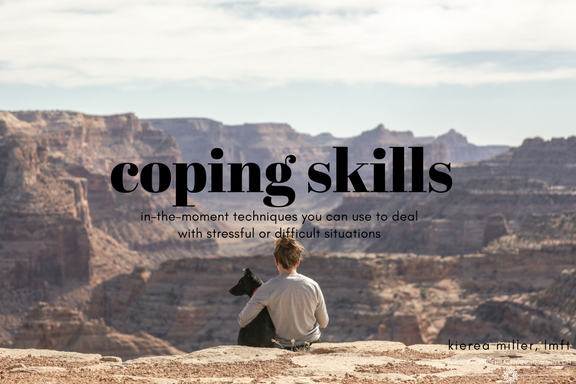Today we’re going back to the basics! Most people have heard the term ‘coping skills’ and today we’re going to dive into exactly what they are, how they can help, and some ideas of ones you can try!
Coping skills are in-the-moment techniques you can use to deal with stressful or difficult situations. Coping skills do not always solve long-term problems, but can help you better navigate and deal with difficult experiences, thoughts, or triggers throughout your day. You may use coping skills to manage anxiety, depression, trauma or addiction triggers, or any number of other stressful and/or difficult emotions and/or situations.
Positive vs. Negative Coping Skills
It is important to differentiate between positive/healthy vs. negative/unhealthy coping skills. Positive coping skills not only help you in-the-moment, but will improve the overall quality of your life if consistently practiced. For example, if you are struggling with low self-esteem, positive coping skills may include meditation, positive self-talk or making a gratitude list. Not only will these coping skills make you feel better in the moment and often keep you from engaging in further damaging thoughts or behaviors, if practiced consistently over time, they can help you improve your overall sense of self-worth.
Negative coping skills may appear to help you deal with a stress in-the-moment, but typically decrease or damage your overall quality of life. For example, the same person struggling with self-esteem that engaged in negative coping skills, such as drugs or alcohol use, restricting or purging food, or acting out violently or inappropriately, may feel better in-the moment (because they are distracted from their negative thoughts, etc.); however, if practiced consistently, over time, they continue to damage not only your self-esteem, but often various other aspects of your life.
In summary, in order to determine if a coping skill is positive, ask yourself:
- Is it helping me feel better in the moment? (Yes for positive!)
- If I continue practicing this coping skill, will it improve my life and overall functioning? (Yes for positive!)
While there are certainly more commonly used coping skills, it is important to find the positive ones that work best for you because what works for your best friend may not work for you. This requires having an open mind and realizing that the process to finding and mastering them may take some trial and error.
Below is a (non-extensive) list of positive/healthy coping skills you can try. Experiment and see what works best for you. There are three steps to help you utilize coping skills effectively (something like that).
- Choose 2-3 coping skills that you are committed to testing out for a set amount of time.
- Commit to practicing those coping skills daily for at least one week. The trick is to make a habit of using them before you need to, so that a) your overall stress, anxiety, depression, etc. is lower–this is practicing self care, and b) so that using the coping skill becomes a habit which will make it easier to utilize it in-the-needed-moment when a stressor arises.
- Determine if the coping skills you’ve tried are beneficial to you and if you would like to continue to use/improve them. If they are not, pick new ones to try (repeat steps 1 and 2).
Remember that developing successful coping skills takes time. Don’t expect perfection the first time you try a new coping skill. Be willing to stick with and develop them. Be willing to try coping skills that initially appear odd, silly or out of your comfort zone. Be patient with yourself. Developing healthy coping skills will allow you the live a happier and healthier life, and will give you a sense of control in the most seemingly difficult situations. You’ve got this!
Possible Healthy Coping Skills
- Journaling
- Drawing
- Deep breathing
- Counting back from 100 (by 7s)
- Tense and relax muscles
- Read
- Call a family member or friend
- Squeeze a stress ball
- Play with putty or play dough
- Sing
- Hold or suck on ice
- Jog/hike
- Dance
- Listen to music
- Watch a YouTube video
- Bake
- Cook
- Crochet
- Watch TV or a movie
- Meditate (look up guided meditation on YouTube)
- Study
- Nap
- Shower or bathe
- Rip up paper into tiny pieces
- Play a game on your cell phone
- Go shopping
- Go for a drive
- Pray
- Count your blessings
- Stretch
- Color
- Do push ups or jumping jacks
- Write someone a letter
- Hug someone
- Close your eyes and imagine yourself somewhere relaxing
- Pet an animal
- Yoga
- Trace your facial features with your finger
- Write or read a list of things you love about yourself
- Think of a name that starts with each letter of the alphabet
- Make a list (grocery, bucket-list)
- Compliment others
- Brush your hair
- Massage your head (hands, forearms, legs, etc.)
- Paint your nails
- Wash your face
- Clean your room
- Repeat a positive phrase
- Set boundaries (say ‘no’ and take a break)
- Read motivational quotes
- Search Pinterest
- Cry
- Laugh
- Eat something every slowly and concentrate on the taste, texture, smell (mindfulness eating)
- Feel different textures (blanket, book, stuffed animal)
- Think about a happy memory
- Invite a friend to do something
- Put on makeup
- Take off makeup
- Hug a pillow or stuffed animal
- Drink water
- Eat something healthy
- Challenge your negative thoughts
- Accept the things you can’t change
- Make a gratitude list
- Smile
- Visualize succeeding
- Practice breathing slowly
- Teach someone to do something
- Look at art
- Feed birds, ducks, ect.
- Organize your closet
- Cook a meal
- Volunteer
- Ask someone to be your ‘vent partner’

